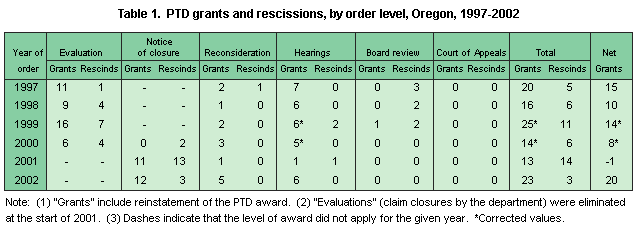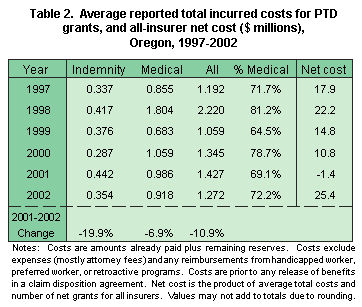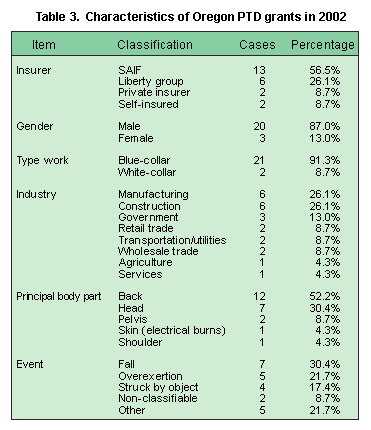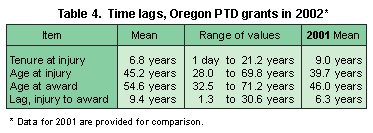
by Russ Reed
Definition
A worker is permanently and totally disabled (PTD) if permanently incapacitated
from regularly performing work in a suitable and gainful occupation (ORS
656.206 and OAR 436-030-0055).
Counts
In 2002, 23 workers were awarded PTD in the Oregon workers’ compensation
system. See Table 1 for counts of awards granted and rescinded, by order
level, for recent years. Senate Bill 220 required transfer of claim closure
responsibility from the department (“evaluation” column in the
table) to insurers and self-insured employers (“notice of closure”);
this transfer was completed by the start of 2001. Recent count fluctuations
have probably been due to this change and the fact that a PTD rescission
is often followed by a reinstatement (seven of the 14 2001 rescinded awards
were reinstated in 2002 alone).


The graph gives historical values of net PTD grants. The sharp increase of net grants in 2002 is more due to fewer rescissions than to the increase in grants. PTD grants, and hence net grants, have declined substantially since 1988, greatly exceeding the drop in claims. For example, accepted disabling claims dropped by 38.0 percent from 1988 to 1998, while net PTD grants dropped by 94.9 percent. Reasons for decreasing PTD awards are listed below, with the primary contributors in bold:
1. Fewer injuries and accepted disabling claims. Improved workplace safety, changes to the Oregon industry mix, and “tighter” compensability standards (particularly major contributing cause, objective findings, disease criteria, and aggravation requirements).
2. Law changes in 1987 (HB 2900). DCBS director-prescribed disability standards (OAR 436, Divisions 30 and 35), reduced Workers’ Compensation Board own motion authority, and change in the court review standard from “de novo” (over again, anew) to “substantial evidence.”
3. Law changes in 1990 (SB 1197). Claim disposition agreements (compromise and release of benefits per ORS 656.236), required reconsideration of claim closures, elimination of “clear and convincing evidence” as a reason to exceed the disability standards, and medical arbiters for impairment disagreements.
4. Law changes in 1995 (SB 369). Limitation on evidence at levels beyond reconsideration; prohibiting (at subsequent levels) issues that were not raised at, nor arise out of, the reconsideration; and definition of “gainful occupation” (ORS 656.206(1)(a)).
5. Administrative rule requirement for a certified vocational counselor to establish the futility of seeking work if claimant hasn’t made reasonable search efforts. See OAR 030-055(4)(c).
Costs
Average and total net costs are given in Table 2. The relatively
small number of grants explains both the variability in costs and long-term
cost increase: average costs are about ten times 1988 costs not just because
medical costs have increased, but also because only the most severely-injured
workers are granted PTD.

Information about the PTD claims and
workers
See Tables 3 and 4. Four workers had tenures of over 15 years when injured,
while four others had tenures of 1, 1, 12, and 53 days. Average worker
age, which was 46 for 2001 grants and was 43 for the 5 years before that,
jumped to over 54 years for 2002.


One reconsideration and all six hearing PTD grants were reinstatements of rescinded awards. Five of the hearing actions were by stipulation. All but two of the grants (one reconsideration, one hearing) were based on medical impairment considerations only — no non-impairment (“odd lot”) factors were mentioned. Four of the grants were for claims that included accepted psychological conditions.
If you have questions about the information contained in this document please contact by e-mail or phone: Russ Reed, Research Analyst, Research & Analysis Section, Information Management Division (503) 947-7343.
This document was originally published in January 2004.
[Printed form: 440-2112 (01/04/IMD)]
In compliance with the Americans with Disabilities Act (ADA), this publication is available in alternative formats by calling (503) 378-4100 (V/TTY).
The information in IMD publications is in the public domain and may be reprinted without permission.